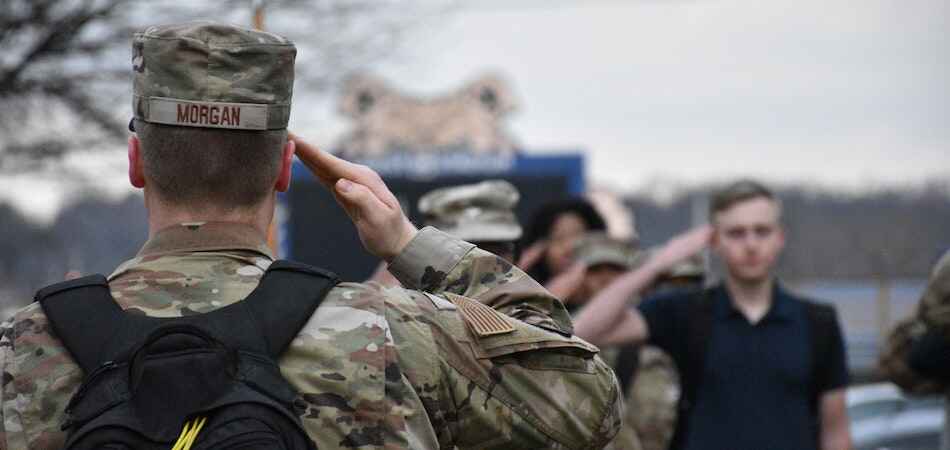AF ROTC interview questions with sample answers
6 Common AF ROTC Interview Questions with Sample Answers
So, you’ve decided to pursue a career in the United States Air Force through the Air Force Reserve Officer Training Corps (AF ROTC).
The program is a rewarding and challenging one. It’ll transform you from a civilian to a military person and make you prepared as a commissioned officer in AF.
One crucial step in your journey is the AF ROTC interview. The interview panel will look for something in you that is essential for an AF officer. These are leadership potential, commitment, problem-solving abilities, teamwork skills, and military knowledge.
To help you prepare for this crucial step, we’ve compiled a comprehensive guide on common AF ROTC interview questions along with sample answers and valuable tips to ace your interview.
Common AF ROTC Interview Questions
During your AF ROTC interview, you can expect a series of questions designed to assess your qualifications, character, and suitability for an officer. You may be asked:
- Tell Us About Yourself
- Why Do You Want to Join the Air Force?
- Describe a Challenging Situation You Faced
- What Are Your Strengths and Weaknesses?
- How Do You Handle Stress?
- What Do You Know About Air Force Core Values?
Here, we will provide a more in-depth look at some of the common AF ROTC interview questions and tips on how to answer them effectively:
1. Tell Us About Yourself
This question provides you with an opportunity to introduce yourself beyond what’s on your resume.
While it’s not a request for your life story, it’s essential to highlight key aspects of your background, such as your academic achievements, extracurricular involvement, and any experiences that have shaped your desire to join the Air Force.
Sample Answer: “Of course, I’d be happy to share. I have a deep passion for both academics and service to my community.
I’ve pursued a degree in [your major] and maintained a strong GPA while actively participating in various extracurricular activities, such as [mention clubs or organizations]. These experiences honed my leadership and teamwork skills.
2. Why Do You Want to Join the Air Force?
When answering this question, delve deeper into your motivations. Explain how your values, personal goals, and aspirations align with the mission and values of the Air Force.
Sample Answer: “I was always inspired by the Air Force’s unwavering commitment to protecting our nation and contributing to global humanitarian efforts.
My desire to join the Air Force stems from a deep-rooted sense of duty, leadership aspirations, and a strong belief in making a difference. And I see the Air Force as the perfect platform to achieve these goals.”
3. Describe a Challenging Situation You Faced
Interviewers may ask you to recount a challenging situation you’ve encountered to assess your problem-solving abilities and resilience.
Use the STAR (Situation, Task, Action, Result) method to provide a structured response. And finally, conclude with the positive results of your efforts.
Sample Answer: “I encountered a particularly challenging situation during my [mention specific experience]. It was a task with [describe the task or challenge] and presented several obstacles, including [mention difficulties].
To address this, I took a proactive approach by [describe the actions you took]. The result was a successful resolution of the issue. Facing the situation I learnt valuable lessons on how to face and overcome adversity.
4. What Are Your Strengths and Weaknesses?
When discussing your strengths, focus on attributes that are particularly relevant to a military career. For weaknesses, it’s important to demonstrate self-awareness and a commitment to self-improvement.
Sample Answer: “One of my greatest strengths is adapting quickly to new environments and situations. My other strength is my passion for regular exercise and maintaining physical fitness.
As for weaknesses, I’ve recognized the need to improve my time management skills. While I’ve made significant progress, I understand that effective time management is vital in the military.
I’m trying to address this by [mention specific actions you’ve taken to improve], and I’m committed to further growth in this area.”
5. How Do You Handle Stress?
In the military, stress management is crucial. Describe your strategies for managing stress effectively, such as time management, prioritization, seeking support from mentors or peers, and maintaining a healthy work-life balance.
Sample Answer: To handle stress effectively, I focus on maintaining a well-organized schedule that includes regular breaks and time for relaxation. I practice mindfulness techniques to stay focused and composed.
Plus, I seek support from mentors and peers, engaging in open communication to address any concerns promptly. These strategies have proven effective in helping me manage stress and maintain peak performance.”
6. What Do You Know About Air Force Core Values?
To prove your dedication to the Air Force, show your knowledge of the core values: Integrity First, Service Before Self, and Excellence in All We Do.
Explain how these values resonate with your principles and how you intend to embody them as an Air Force officer.
Sample Answer: “The Air Force’s core values are Integrity First, Service Before Self, and Excellence in All We Do.
Integrity First means acting honestly and ethically in all situations, even when no one is watching. Service Before Self emphasizes the willingness to put the needs of others and the mission above personal interests. Excellence in All We Do reflects the commitment to continuous improvement and striving for the highest standards.
These values align perfectly with my principles, and I am dedicated to upholding them throughout my journey as an Air Force officer.”
These are just a few examples of AF ROTC interview questions and answers.
These sample answers should serve as a guide to help you prepare for your AF ROTC interview. Customize them according to your experiences and beliefs and you’ll be well on your way to a successful interview.
Pro Tips for a Successful AF ROTC Interview
- Confidence and Positivity: Maintain confidence and a positive attitude throughout the interview. Confidence shows that you believe in yourself and your abilities, and positivity can leave a lasting impression on the interview panel.
- Body Language: Remember that your body language matters. Maintain good posture, make eye contact, and use gestures appropriately to convey professionalism and engagement.
What is the purpose of Air Force ROTC?
The purpose of the AF ROTC is to:
- Develop and train future leaders for the United States Air Force
- Provide college students with military training, education, and experience.
- Allow students to pursue their undergraduate degrees simultaneously.
- instills core values such as integrity, service before self, and excellence in all endeavors
- Producing individuals well-rounded with knowledge, skills, and virtues.
Preparing for the AF ROTC Interview
- Research the AF ROTC Program: Before you step into the interview room, it’s essential to have a thorough understanding of the AF ROTC program. Research its history, mission, and core values. This knowledge will show your dedication and genuine interest.
- Know the Interview Format: The AF ROTC interview typically consists of a board of officers assessing your qualifications and asking you a series of questions. Familiarize yourself with the interview format to reduce anxiety.
- Review Your Application: Take a close look at your AF ROTC application, including your resume, academic achievements, and extracurricular activities. Be ready to discuss any relevant experiences.
- Practice: Practice makes perfect. Consider conducting mock interviews with mentors, peers, or even through online resources. These practice sessions will help you gain confidence, refine your answers, and become familiar with the interview setting.
What are the benefits and challenges of ROTC?
As a military enthusiast, you’re going to experience some exciting things in ROTC.
As we all know, anything to achieve needs to be paid something. ROTC isn’t an exception. So, some challenges you’ll face here too.
| Benefits | Challenges |
| 1. Scholarships are available | 1. If you fail to graduate, you must refund your scholarships. |
| 2. Monthly stipend $250-$400 | 2. Requires a high level of time management and dedication. |
| 3. Have the facility to experience the flights of military aircraft. | 3. Drugs or alcohol are strictly prohibited. |
| 4. High-salary job in the military starts from $61,200 per year. | |
| 5. Have opportunities to travel all over the US and outside the US. |
Final Words
Preparing for the AF ROTC interview is a significant step toward your goal of becoming an Air Force officer. By researching, practicing, and crafting effective responses to common interview questions, you can confidently face the interview panel.
Remember, this is your opportunity to make a strong impression and embark on a fulfilling journey with the AF ROTC program. Best of luck!
FAQs
1. When should I start preparing for the AF ROTC interview?
Start preparing as soon as you decide to pursue the AF ROTC program. The earlier you begin, the more confident you’ll be during the interview.
2. What should I wear to the AF ROTC interview?
Dress in professional attire, such as a suit or business dress. A neat and polished appearance is essential to impress the interviewer.
3. Can I bring supporting documents to the interview?
Yes, it’s a good idea to bring copies of your resume and any relevant certificates or transcripts. It demonstrates your preparedness.
4. How long does the AF ROTC interview typically last?
The interview can vary in length but generally lasts between 30 minutes to an hour.
5. How competitive is the selection process?
A: The selection process can be competitive, but a strong academic record, leadership experience, and a genuine passion for the program can enhance your chances.
6. What should I do after the interview?
After the interview, send a thank-you email to the interview board expressing your gratitude for the opportunity and reiterating your enthusiasm for the program.

